Soul of the West: Magick, Awakening and the Hellenic Gnosis
(Originally delivered as a talk for Occulture Berlin, October 2019)
I’m going to be talking about four things:
Asking the question: During the last century, what happened to the place of awakening, the Great Work, in the world of magic?
How to examine the consequences of what we believe; maps of the realities we find ourselves in – i.e. cosmologies
Awakening and the Hellenic gnosis, the origin of Western civilization, practices of the Hellenic gnosis
What is awakening all about anyway?
MAGIC AND AWAKENING
What happened to magic in the 20th century? Of all the possible narratives we could build of that era, I am going to pick one about the loss and rediscovery of the goal of awakening for magic.
Let’s start with Crowley, who birthed an initiatic scheme in a cultural context of scientific materialism.
First, it’s worth making a distinction between science and Scientism. The former is a set of methodologies based on logic and experiment. The latter is a religion. The dominant religion of our culture.
Scientism is the faith that, at least in principle, science can explain everything, so that we need no other way of apprehending the world. In this context, ‘everything’ means everything that those strong in the Scientism faith deem worthy of study. So it’s out with ghosts, the paranormal, all of magic and even in the loony fringes of scientism, consciousness itself. The latter position, that consciousness doesn’t really exist, spoken or written by a conscious being, is perhaps the most ridiculous philosophical position imaginable. When our culture’s chief religion is so unworthy of respect, no wonder some people worship flying spaghetti.
Once you’ve got Scientism as the main religion, people find it hard to believe in things like awakening, especially if they’re associated with belief in magic or God.
So this is the world in which Crowley brought forth his initiatic scheme – the Holy Guardian Angel, the AA grades, the Great Work as the crown of magick:
The Great Work is the uniting of opposites. … Although the Great Work can describe specifically the moment of union between the self and the divine, it can also deal with the spiritual process in its entirety.
And here’s the initiatic schema of the AA:
The ancestors of that Qabalistic scheme are obviously Jewish mystics influenced by Neoplatonism. In other words, this model goes back a long way. It’s a legacy from older cosmologies that most people find it hard to relate to these days, with its planes and rays and worlds, but even worse, it reaches up to Almighty God.
This was a ladder of awakening encoded by people who’d been there. But they went there in a different era.
At this point he’s already lost a lot of potential aspirants, whose intellectual diet has been physicalist with a touch of existentialism. Why should you have to sacrifice belief for some cosmology based on things you haven’t yet experienced and doubt they really exist?
I was like that.
Some people attempted to sidestep the apparent mismatch between science and magic; in the years after the psychedelic era of the late 1960s, the New Age arose as a popular movement to bring magic back into the world. However, new age ideas tend to require the reader to abandon all critical thought.
I think Terence McKenna had the new age's number:
"The New Age generally I find somewhat obnoxious because it’s a flight from the psychedelic experience. What you can safely say about the New Age; if a technique doesn’t work, they’ll proclaim it.’
In other words, the New Age is what’s left over when you come down from the acid.
In the 1970s another magical current arose – Chaos Magic.
Early Chaos Magic had a pragmatic heart; a return to focusing on what used to be called ‘Low Magic’. It also had an anarchic swagger, and a tendency to construct a scientific approach to magic, as exemplified by Pete Carroll's and Ray Sherwin's early writings.
This is why CM succeeded so well – it was the only magical model around which didn’t require that you abandon reason.
At this stage, with early CM, the notion of any ancient wisdom has contracted to the ill-defined category of Shamanism, because it seemed to fit much better with the technical emphasis of early CM. Here's a lineage chart that appeared in Liber Null:
Early in my own magical development I realised I need to work in two directions. Early CM fulfilled my need to do practical magic and thereby prove to myself that Scientism really was a rubbish model of the universe. But early CM didn’t address the yearning for higher consciousness, for dwelling in the deepest places of knowledge about the world and the self that I’d blundered into on some of my teenage acid experiences. Those feelings of unity with all, those feelings of undoing my surface self and living from somewhere deeper and more real.
My 1997 book Chaotopia! Was an attempt to bring those two paths together. To subject the religion-contaminated field of mysticism to the same critical and pragmatic approach that had succeeded so well in practical sorcery, in early CM.
The book was a ‘hypersigil’, whose intent was to extend CM-type discourse into mysticism. And it worked.
Julian Vayne and Greg Humphries wrote about the HGA in a book on Chaos:
And Alan Chapman got into this issue in a talk entitled ‘How to Spell: Magick with a K’ in 2008, at the IOT’s ‘Colours of Chaos’ public event, and in his book Advanced Magick For Beginners.
So the circle was beginning to close. In summary, this is my history of what happened to the idea of awakening through 20th century magick:
COSMOLOGIES
All belief schemes implies a particular kind of universe the believer is living in.
What do each of those universes actually do for us? When we believe in one or other of these realities, what kind of universe do we inhabit?
And is it any good?
Let’s take the cosmos of Scientism, as out cultural starting point:
Is it any good? No, it isn't. It's a PRISON PLANET cosmology.
In the 1970s, after the peak of the psychedelic era, the new age arose. Taking our cue from McKenna, here's its cosmology:
Which I’d also award a Thumbs Down.
One way to think about this cosmos is that it has yet to undergo the purifying reductionism of early Chaos Magic, in which the methodology of magic is brought into question and thereby sharpened, made new.
Here’s a Chaos Magic cosmology:
I think that's something of an improvement over Scientism and the new age.
We see the dissolution of sacredness in early CM, the rock-bottom metaphysics of the Kali Yuga. This is it, the point where the cycle turns, where the old has reached its nadir - see the spiral history above.
However, that early Chaos Magic lacks any perspective on awakening.
So, what about constructing a usable cosmology which contains the idea of awakening?
Starting from scratch, what might a traditionally-influenced cosmology look like?
Being constantly Becoming, a traditional cosmology that not only includes the downward arc of manifesting the world, avoiding that escapism into celestial realms, but also emphasizes that the full consciousness is only to be found in the overall process:
So let’s give a name to this overall Being:
The circuit is the process of consciousness, and it is recapitulated fractally at every level.
We are not trapped in one or the other level here. It’s all one scheme. As with Crowley’s 0=2, duality and being are part of the same capacities of ourselves as divine beings.
THE HELLENIC GNOSIS
Going back to our traditional cosmology, how do people progress along a path of awakening?
These days, it’s often Buddhism, of the variety that’s been called American Folk Buddhism.
I’ve nothing personally against that current of awakening, but wouldn’t it be better if we had a scheme of awakening that not only helped us achieve awakening but helped us make sense of the culture we find ourselves in, here in the West?
Just as it seems crazy to me to talk of colonizing other planets when we are doing so poorly at managing the ecosystem of out home world, similarly it seems crazy to seek for wisdom only in foreign places. Wouldn't it be better to go to the heart of our own culture, acknowledge what went wrong with it and see what we can do about it?
Here’s some words from Carl Jung:
"If we snatch these things directly from the East, we have merely indulged our Western acquisitiveness, confirming yet again that 'everything good is outside', whence it has to be fetched and pumped into our barren souls."
… it is our task to build up our own Western culture, which sickens with a thousand ills."
People have been talking about this issue for decades now. Those of my age group are likely to remember Robert Pirsig’s Zen and the Art of Motorcycle Maintenance.
The entire book is an exploration of what makes the Good in engineering, in art and human life. It’s not about Zen. He’s following a trail which leads back before Plato. I suspect though that the publishers thought the title is more commercially appealing than ‘The Pre-Socratics and the Art of Motorcycle Maintenance.’
Consider this quote from that book:
And the bones of the Sophists long ago turned to dust and what they said turned to dust with them and the dust was buried under the rubble of declining Athens through its fall … buried so deep and with such ceremoniousness and such unction and such evil that only a madman centuries later could discover the clues needed to uncover them, and see with horror what had been done.
That passage is quoted in another book, Reality, by Peter Kingsley.
Peter Kingsley’s works points to an ancient gnosis that travelled from Hyperborea in North-East Eurasia, via Anatolia to Greece, descending through Pythagoras, Parmenides, Empedocles, Zeno and the Sophists.
Those last few names are usually lumped together as the pre-Socratics, those thinkers who came before Plato and Socrates. Much of Plato’s work is concerned either with owning that tradition as a primitive precursor to his own more enlightened thought, or trashing it completely.
Plato is one of those whom Robert Pirsig accuses of burying the sacred lineage of the ancient Greeks.
That magical tradition is glimpsed like a series of bubbles reaching the surface from the buried ruins of pre-Socratic Greece. Between these bubbles we can discern a thread, getting clearer year by year. That thread begins, at least for the Hellenic world, with Pythagoras and is perhaps seen most clearly in Parmenides and Empedocles.
And it was Parmenides who started our culture.
The origins of our Western technological civilization are to be found in logic and reason. And where did they come from? Directly channelled from the gods.
Parmenides was the first to write about logic, and he did so in a poem, which was a transcript of a dialogue he had with the Goddess of the underworld.
Our rational culture came originally from prophecy, from a Goddess. Kingsley writes:
The original purpose of logic was to bring us back to the divine law.
We have perverted it, using to support the illusions of life rather than undermine them.
The law has been corrupted
Later, Socrates used reason, to challenge the assumptions that people have about the consistency of their cosmos, challenging it until it falls apart into aporia, pathlessness, and the interlocutor’s sense of self is unseated.
This is a dangerous game, this aporia, this negative way of truth; people don’t like being led into the abyss of incoherence that lies behind the most apparently-coherent worldview. What Socrates was doing to the citizens of Athens got him killed.
But Socrates was part of a continual tradition of teachers who embraced the terror of logic.
PRACTICE
So what did this ancient lineage of mystics and magicians actually do to attain their awakening?
Right from before Pythagoras we have records of people lying down in the dark, and not to sleep, but to gain wisdom or healing, when nothing else worked.
Here’s an Asklepion, a temple of healing dedicated to Asklepius, the culture-hero/demigod of healing in ancient Greece. Apollo also figured as the main god of healing. His cult built temples with places for incubation, for lying down in darkness.
Apparently, members of the public who wanted healing could come to a priest at the Asklepion and ask him to dream for them, to divine a treatment. That was the most basic level. When someone had a problem that seemed insoluble, then they would themselves go into the chamber and lie there until the gods came and healed them. Which might take days.
This was a practice based on giving up completely. Nothing else worked, so you give it up to the gods.
Here’s some modern research with bearing on the power of incubation. A group of researchers presented a paper at the Breaking Convention conference called The Anechoic Darkroom as a psychedelic state.
This is an anechoic darkroom:
And here's the paper:
In case you think that’s an exaggeration of its potency, the paper quotes the following results:
'Even after just 2 hours of dark and silence, 20% of participants reported auditory hallucinations (or was that Apollo speaking?) and 10% of people reported feeling the presence of another sentient being in the room; it was not in most cases benign.'
Imagine what a few days in the Apollo cave, warded by the priests, would do!
And what about the most ancient layers of all – the painted caves...?
So how do we adapt this to modern practice? Few of us have a nice warm cave to practise in. The basis of incubation practice is lying down in surrender, giving up; Peter Kingsley's advice for emulating incubation is to ‘lie down and die’
Alan Chapman elaborates three lying down contemplations:
They all direct you to awareness of who you really are, a divine human being.
WHAT IS AWAKENING ABOUT ANYWAY?
First, let’s get a common and toxic misconception out the way. The idea that awakening is to do with Escape from the Meat Suit. This is where you kind of leave your pathetically mortal body and the messy world behind.
This nasty little model isn’t restricted to New Agers – some more sophisticated people also subscribe to it. I give a lengthy and complex argument as to why this model is so rubbish in my book Life Force. There' no room for it here, so if you want the full version you’ll have to read the book!
But what it amounts to in brief is that we don’t actually 'have a body’ as such, not in any subjective sense. Obviously, we do when observed from the outside, but the idea of a body being a primary source of sensation and being, that’s nonsense – our experience is made up of streams of impressions and sensations, which are better considered as bands of energy.
As William Blake wrote in Marriage of Heaven and Hell, in 1790, when the hellish Cartesian dualism was rising to dominance, putting the words into the mouth of his rebel devil character:
‘Man has no body distinct from his soul; for that call’d body is a portion of soul discerned by the 5 senses … Energy is the only life and is from the body and Reason is the bound or outward circumference of Energy. Energy is eternal delight.’
This opens up the biggest question about awakening – who or what is it for?
To look at this question, I’d like to take a step back and look at ideas of what magic is for.
Pre-Chaos, magic tended to get divided into High magic and Low Magic.
High Magic is about attaining Knowledge and Conversation of the Holy Guardian Angel and, ultimately, full spiritual awakening.
Low Magic is sorcery, doing spells to improve your wealth, your love life, spells to heal and spells to mess with the bad forces in the world.
Chaos Magic is a scheme you come in through Low Magic, through sorcery.
These two paths meet in the person of the working magician who serves their community. In Voudon, this is called servir a deux mains.
And there is yet another function of the magician. It is said that the awakened human being has a role to play in the very creation of the world.
Years ago on the radio I heard an interview with an old Inuit shaman. He said that, as powerful as he was, the old shamans were much more powerful: they used to have to make the sun come up in the morning.
This idea is also in the Storylines of the Australian peoples – they too say they are maintaining the world’s very existence with their collective singing.
Peter Kingsley writes:
'The real purpose of meditation, of awakening, is not about kundalini, energy etc etc, it’s not about us, it’s about finding our place in the cosmos and fulfilling that role.'
And he depicts that role as being involved in a larger, more inclusive psychic ecosystem than just us living humans. It needs to include the gods.
This last few years working with Alan Chapman’s Magia have been an adventure. Magicians with a Chaos background such as myself tend to be tied strongly into the Faustian bargain. We grew up with that peculiarly Western myth of Faust, an early-modern version of the abandonment of the Great Work in pursuit of temporary power. Early Chaos Magic came from a position of ‘we have to do it all ourselves’. There’s a strong resistance to giving over our apparent agency to the Other of spirit.
We think if we get into mysticism we won’t be magicians any more.
This attitude is an artefact of dualistic thinking.
Not only that, but such an attitude is profoundly linked to the corruption of reason that lies at the heart of our culture. Because it’s not a case of giving up magic. Rather, we’re living in a bigger magical world, an expanded ecosystem of spirits and ancestors. Within that world, our very being helps to complete the Aeonic task, helps to remake the world. We are not relinquishing magic, but living right at its very heart.
CONCLUSION
I started off by asking what had happened to the goal of spiritual awakening in western magic. It had to go away, because our culture, with its endemic scientism, had so corrupted the ideas of mysticism.Instead, we had to learn to do magic without mysticism, without God.
Chaos magic did this, and thereby provided an opportunity to step outside of Scientism without taking on the baggage of other religious models. This opened the door to the possibility of a new, critical approach to the mysteries of awakening.
This took place at a time when the origins of our own culture are being revealed as magical in essence. Our spiritual awakening can now be nourished by the same source that gave rise to our culture.
Released from the spell of scientism, and equipped with ancient methodologies of of apprehending truth, we have the germ of a genuinely vital wisdom culture.


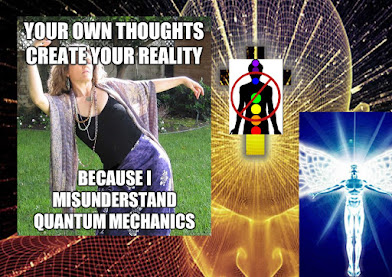

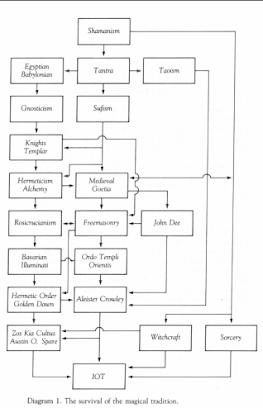



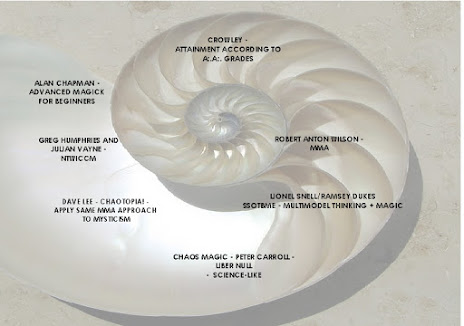





















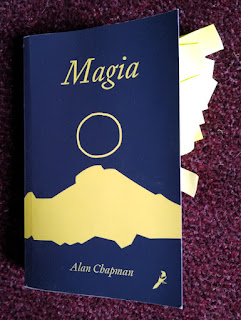

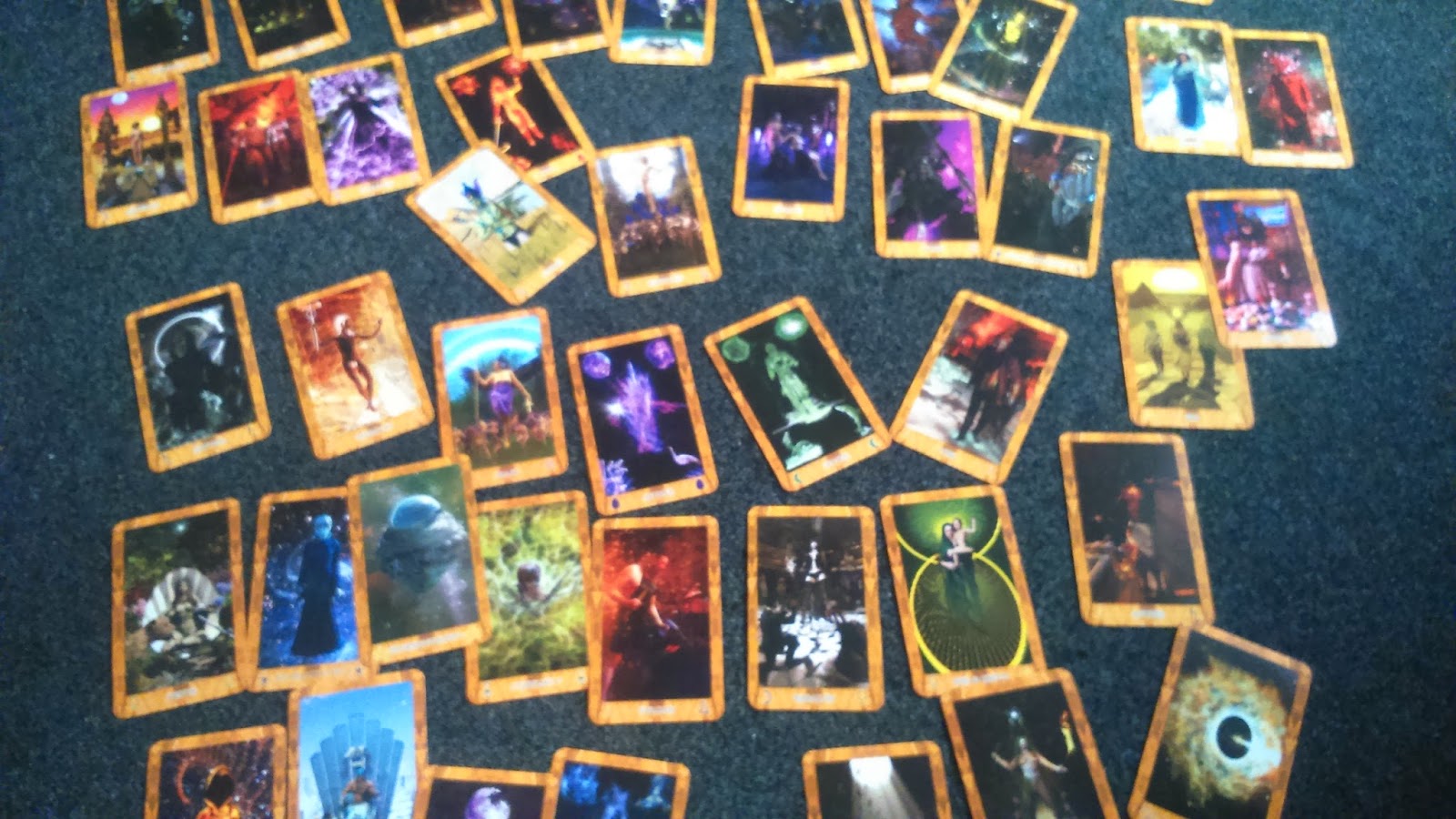
Note added after publishing this material here: After my talk in 2019 I wondered if I'd been a bit harsh on New Agers. Then later I learned that many of them are flocking to the drink from the diarrhoea puddle of QAnon. No, I wasn't too harsh. That sloppy uncriticality is the very thing that makes them vulnerable to such toxic lies.
ReplyDeletethe picture of the three lying down contemplations appears to be broken
ReplyDeleteFixed it
Deletegreat, also an enlightening overview of awakening and magic, thanks
DeleteGreat text!
ReplyDeleteThank you
Delete